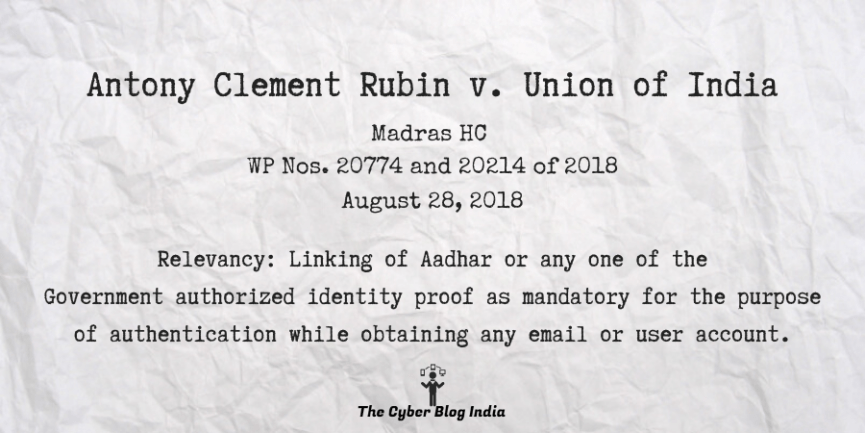Antony Clement Rubin v. Union of India

Antony Clement Rubin v. Union of India
In the High Court of Madras
WP Nos. 20774 and 20214 of 2018
Before Justice S. Manikumar and Justice Subramonium Prasad
Decided on August 28, 2018
Relevancy of the case: Linking of Aadhar or any one of the Government authorized identity proof as mandatory for the purpose of authentication while obtaining any email or user account.
Statutes & Provisions Involved
- The Information Technology Act, 2000 (Section 2(w), 69)
Relevant Facts of the Case
- Writ petitions have been filed by the petitioners under Article 226 of the Constitution of India.
- Petitioners are demanding to issue a writ of mandamus directing the respondents to declare that linking of Aadhaar or any one of the Government authorized identity proof as mandatory for the purpose of authentication while obtaining any email or user account (Social Media Accounts – Facebook, Instagram, YouTube and Twitter or Utility Accounts, Paytm, Uber, Ola, Gmail, Yahoo and Hotmail) thereof.
- Also, to appoint a special and skilled task force to monitor into the rising instances of all sorts of cyber defamations and cyber stalking and to protect the innocent victimized e-citizens of India every day.
Opinion of the Bench
- Section 2(w) of the Information Technology Act, 2000 defines intermediary as, “with respect to any particular electronic records, means any person who on behalf of another person receives, stores or transmits that record or provides any service with respect to that record and includes telecom service providers, search engines, online payment sites, online-auction sites, online-market places and cyber cafes”.
- Section 69 of the Information Technology Act, 2000, deals with the power to issue directions for interception or monitoring or decryption of any information through any computer resource.
- Section 69(1) states that where the Central Government or a State Government or any of its officer specially authorized by the Central Government or the State Government, as the case may be, in this behalf may, if satisfied that it is necessary or expedient so to do, in the interest of the sovereignty or integrity of India, defence of India, security of the state, friendly relations with foreign states or public order or for preventing incitement to the commission of any cognizable offence relating to above or for investigation of any offence, it may subject to the provisions of sub-section (2), for reasons to be recorded in writing, by order, direct any agency of the appropriate Government to intercept, monitor or decrypt or cause to be intercepted or monitored or decrypted any information generated, transmitted, received or stored in any computer resource.
- Thus, a conjoint reading makes it clear, that when required by lawful order, the intermediary shall provide information or any such assistance to Government Agencies who are lawfully authorized for investigative and protective activities.
- The information or any such assistance shall be provided for the purpose of verification of identity, or for prevention, detection, investigation, prosecution, cyber security incidents and punishment of offences under any law for the time being in force, on a request in writing clearly the purpose of seeking such information or any such assistance.
Final Decision
- In the present case, though the requests have been made by the Cyber Crime Cell Commissionerate of Chennai, to furnish details, social media companies have not furnished in many cases and also rejected the requests.
- Having regard to the fact that some information, disseminated, is an offence, punishable under Indian law, the law enforcing agencies request the intermediaries to furnish details for investigation/detection and as per rule 3 of the Information Technology (Intermediaries Guidelines) Rules, 2011, the intermediary shall observe due diligence in the discharge of its duties.
- The Court is of the view that platforms like, Facebook, Twitter, YouTube, Whatsapp, Google, etc. from whom information is sought for investigation, Cyber Crime, Commissioner of Police, are required to be heard, as to why they should not be made as party respondents, to these writ petitions.
- A notice was ordered to Facebook, Twitter, YouTube, Whatsapp, Google, returnable by 18.09.2018.
To read this case summary in Hindi, click here. | इस केस सारांश को हिंदी में पढ़ने के लिए यहाँ क्लिक करें।
